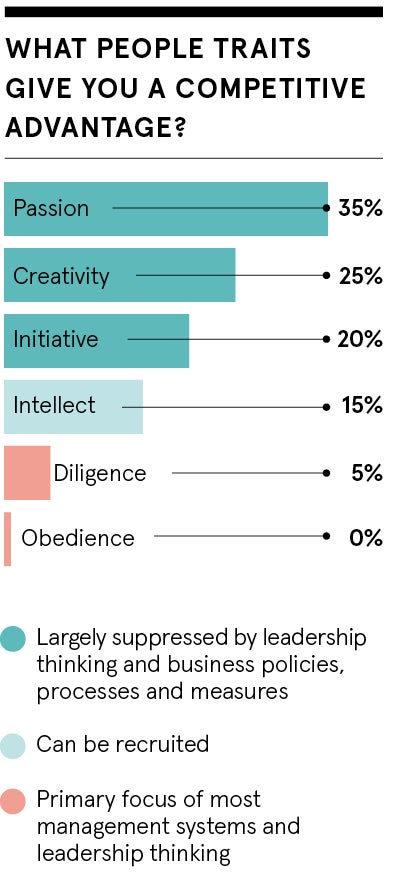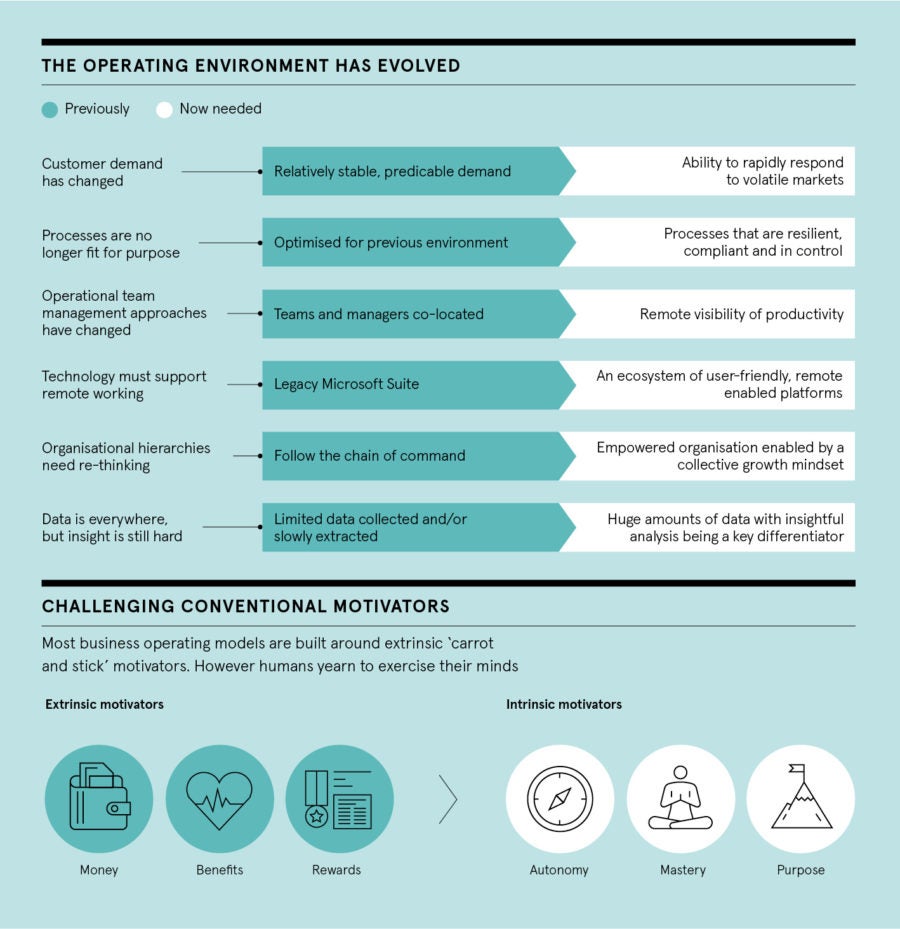Given the unprecedented global events, it’s no surprise that the dramatic pace of change in the business environment has created a need for agility in the ways companies operate, innovate and respond to customer demands. Attempting to achieve this way of working, which startups are typically born with, is exposing inherent inefficiencies that exist in large, well-established organisations.
These structural inefficiencies mean that when companies try to respond and adjust to change, they face challenges in sustaining operational performance and a competitive edge in the market. It’s commonplace for companies to have teams working in silos, decision-making slowed down by bureaucratic approval procedures and employees fearful of challenging archaic processes.
This is naturally resulting in companies racing to transform and place agility and operational performance at their heart. However, seven in ten operational transformation programmes fail to generate their expected outcomes or lack the specific mix of elements to sustain, according to Baringa Partners, a consultancy that helps businesses to operate more effectively, navigate industry shifts and reach new markets.
“In times like these, most companies will quickly pivot into revised operational strategies and then jump straight to action before fully understanding how they’re going to do it,” says Rob Maguire, people and process excellence lead partner at Baringa. “They are often making decisions based on gut feel and without good data. After the initial knee-jerk, building a sustainable way of daily working in this new environment is crucial.”
Creating a culture for sustainable change is vital to any successful transformation. Agility must be treated as an entirely new way of working, not a one-size-fits-all project with a defined start and end point. Leaders should adopt a servant leadership mindset whereby they empower their people to innovate, rather than rely on their own historic experience and learnt behaviour.
To remain agile, leaders must balance their desire for increased levels of control and compliance while moving decision making to where the information sits
Furthermore, companies should identify where they need to progress from traditional silos and hierarchical organisational structures to create dynamic teams able to deliver at pace for their customers.
Central to achieving this empowered culture is an underlying principle that employees have the psychological security to fail fast and learn from mistakes. Cultures of blame and traditional performance management are frequently entrenched in large organisations, so leadership teams must seek to undo them and unlearn the underlying behaviours.
To assist with this, Baringa works with client leadership teams to create business communities in which people have the freedom and permission to test and learn without the fear of failure.
“It’s very liberating,” says Oli Barnett, people and process excellence partner at Baringa. “This requires several elements to be in place, including a high level of institutional trust, a mandate from senior leadership, clarity around the company’s purpose and a totally engrained vision so people know what success is and how to achieve it.”
Rather than seeing operational excellence and organisational agility as two separate components of a transformation programme, Baringa encourages companies to bring their underlying skillsets and capabilities together. Many organisations will go about hiring a large improvement workforce, comprising of both operational excellence and agile capability and knowledge, without realising that much of the skillset already exists in their business. By upskilling and repurposing their existing talent pool, organisations can achieve faster and more sustainable transformation.
With the rise of automation-based technologies, such as intelligent process automation, now often a firm fixture in business operations, it’s also important companies build a hybrid workforce that treats digital workers culturally as an extension of the team while continuing to incentivise human staff. Baringa has developed digital workers that mimic human behaviour by greeting colleagues in the morning, creating digital personas that mix in with the human talent.
“Organisations need to recognise that digital workers need support as much as human workers,” says Maguire. “If you consider the speed of change and agility in how businesses are evolving, as a person you need to be constantly updated in the new ways of working and it’s the same for your digital workforce. It can’t just be fire and forget.”
To support its clients undergoing transformation journeys, Baringa has developed an operational resilience framework focused on data, daily ways of working and remote capability building to deliver rapid, sustainable results. Its 3D Transformation Framework centres around three core dimensions for achieving operational resilience: end to end, team by team and again and again. The unique proposition challenges the thinking of many traditional responses by developing a sustainable link between benefits certainty and cultural advantage.
Rather than relying on two or three “silver bullets” to drive through change, Baringa believes that instilling operational resilience requires organisations to embed 50 “silver pellets” across the business. As such, the most successful transformation programmes utilise a range of levers to realise their benefits profile and Baringa’s research shows that many of these levers are cultural. Examples include leaders fostering a learning environment by giving intent to their people rather than issuing orders, which is outlined in L. David Marquet’s book Turn the Ship Around.

Secondly, while financial results should be seen as an inevitable improvement outcome, it should not be the sole purpose for transformation. A common mistake that many global organisations make is focusing only on pounds and not also considering their customers and employees. By centring on this triple win, organisations create a sustainable and competitive advantage that unlocks long-term incremental value.
Much has been written on the power of a growth mindset, however this cannot be overstated. Leaders who have a mindset of embracing challenges with a greater persistence, seeing effort as the path to mastery and staying curious throughout the transformation journey, will ensure a higher propensity for success.
Engaged employees look forward to building communities and feeling connected to the company’s mission. Employee engagement indices (EEI) are key measures for organisations to gauge future success. Employee engagement leads to improved performance in the workplace and organisations in the top quartile of engagement have significantly higher profitability and customer ratings, less turnover and absenteeism, and fewer safety incidents than those in the bottom quartile.
“Volatility isn’t new, but today’s velocity and uncertainty is,” says Barnett. “Organisations that are engaged, agile and can transform in a way that doesn’t require the cost of rebuilding their internal change capability, hold the key for short and long-term success. They have a DNA engrained in their culture where naturally they are empowered to adapt and improve.”
For more information on Baringa’s approach to operational excellence or how we can help your organisation with its operational response to COVID-19, please contact OE@Baringa.com


